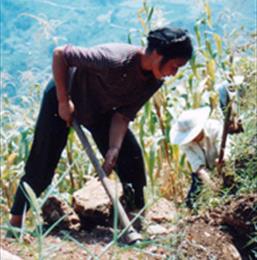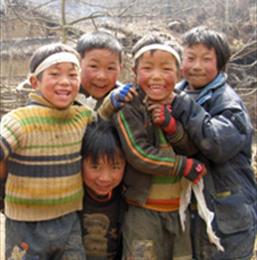Sugu Village Women's Rural Credit Scheme
Background
In 1997 we decided to begin an experimental project in Sugu Village. This is an exclusively Yi village and was where Rose stayed for a week doing research on the Yi people (see the research report for a more detailed look at the village and Yi people).
Before implementing the rural credit scheme Rose spent some time discussing the design of the project with the loanees. The idea was that they should as far as possible feel that the scheme is their own, that the structure is appropriate to their needs, and the repayment schedule fits well with their availability of saleable goods or wage income.
We felt that the scheme should be flexible around some main points, such as the maximum loan size; repayment in stages; some management fee to be paid; the women must be organised into small groups. We also said we'd arrange training on any topic they are interested in.
Meeting on the Rock - Report on Sugu Village hamlet 4 meeting, 8th July 1997 by Rose Acock.
The hamlet leader (duizhang) of hamlet 4 had already told everyone in the hamlet there would be a meeting for the women. At 7.30pm we met on the big rock where the village gathers. First it was only men and children that came, only after the hamlet leader called out and some men went to fetch their wives did the women arrive. About 100 people gathered there altogether. I had brought some sweets for the children. It was a long wait for everyone to assemble. Ms. Gan, a Yi woman who was women's cadre at the township government, introduced the idea of a rural credit scheme, giving some background - why the loan was to women, group formation etc., saying that our scheme was not yet finalised, that many points we could fix later. She explained that our scheme in outline is fairly simple, with few rules and responsibilities. It is open to all the village. We needed to give people a little time to think and discuss so we met later back at the hamlet leader 's house. The idea was that women could come and ask any questions. Ms. Gan's introduction was in Han (rather than the Yi language), so would have needed some clarification.
Registering Names at the Hamlet Leader's House
Soon people came to the hamlet leader 's house. We put a table outside and a lamp. We put together a list of names and noted what the women would like to use the loan for, how much it wanted to borrow, how they planned to repay. They all wanted to borrow the maximum 1000 RMB, and all wanted to make equal one monthly repayments. We asked them about their means for repaying, for example if they said they raise pigs and would sell to repay we asked how many pigs they had and when they would be ready for sale. Some had obviously thought hard about it, and had it all clear. Some men came and tried to register their wives names, I insisted that we were loaning to women, they were responsible for repayment, they were to register and the loan would be issued to them!
We had a short discussion with each woman, her sitting at the table with us and going through what she wanted to do. This was mainly in Yi, although when I asked questions most women did answer me in Han. We used their Yi names, one or two put their Han names, but we wanted to use the names everyone in the village knows them by.
Gan and I prepared a repayment plan/contract for the women. Our idea was to keep it as simple as possible, but to make it clear that there is some group responsibility, so the individual signs and DORS, but also the group leader and central leader have to approve the project and sign to say they think that person can repay. It also has a table for the repayments with the date according to the Chinese lunar calendar and the amount due. Our idea was that this could be flexible although designed with the women before hand. I took the form to type, two copies for each woman, one for her and one for DORS. We also prepared a form for the central leader to keep track of all the repayments and keep a total for each month.
A few days after this meeting, we returned to the village and issued the loans. 20 of the 30 women in no. 4 village group took DORS loans. Since then DORS have expanded the scheme to other hamlets (zu) within the village.
Women in this village borrowed money for purchasing a cow for ploughing the fields, or a horse for transport on their farm and for carrying supplies and goods for sale up and down the steep hillside. They will repay the loans with cash made selling piglets and full-grown pigs as well as their surplus agricultural produce such as beans, maize, and walnuts. At the beginning we have found that it is difficult for people to decide the best way to run the scheme given they have no previous experience of this type of scheme (although informal loans between households are very common), but hopefully as the scheme gets going we will be able to experiment and adjust as necessary. People in nearby villages will hear all about the scheme and will be debating different methods so that the next scheme will have even more input from an earlier stage.
The funding for this project has come from DORS' general unspecified funds and also a donation from Misereor (Germany).
In 1998 loans were made for the second time in Sugu hamlets 4 and 5 after repayment in full of the previous loans. In 1999 loans were made a third time to Hamlet 5 after they repaid their previous loans in full.
Assisting Schoolchildren - DORS Education Project
DORS have been providing education assistance to children in Sugu village since September 1997.
To read more about our support of students please visit our Education Project page.
Sugu Hamlet 6 Electricity Supply Project
DORS is helping the 19 households of Sugu Hamlet 6 to install an electricity supply. The electricity is from a hydro-power station in a nearby county. DORS are paying part towards the project and the Township Government are also contributing to the cost of materials.
In progress.
Sugu Hamlet 6 Irrigation Water Supply – Micro-project
This remote and very poor hamlet has only a small land allocation and frequently experiences drought and poor harvests. There was only a small amount of irrigated paddy land. The villagers requested that DORS assist them to increase this area by providing some piping to utilise additional irrigation water and open up more rice fields. Four households benefited from the project, and now have higher grain yields.
Sugu Village Social and Community Forestry
Sugu Village - Hamlets four and five:
DORS has implemented several rural development projects in hamlets four and five of Sugu Village. During a visit regarding a micro credit scheme DORS was told that the two hamlets were participating in the national re-afforestation scheme ‘tui geng huan lin’ (return agricultural land to forest). But it became evident that many of the inhabitants of the hamlets were unable to participate in this scheme as the subsidised prices of the saplings were still considered to be prohibitively expensive.
It was decided that DORS would help in the purchase of the saplings by covering half of the villagers’ contribution, and all the costs of the particularly poor households. Furthermore, DORS would supervise the delivery of the saplings by the forestry department and provide training to the villagers in planting techniques and future management where needed.
Although a simple project, it was felt that the opportunity should not of been lost in helping the poorest members of the community to purchase the saplings. This will ensure that the differential between the poorest and richest households in the hamlets is not increased through the future income of the walnut and chestnut trees supplied through the forestry departments’ re-afforestation project.
Completed 1st November 1999
In March 1997, Rose spent a week studying Yi culture in Sugu Village, see her research report for a more detailed look at the village and Yi people.


